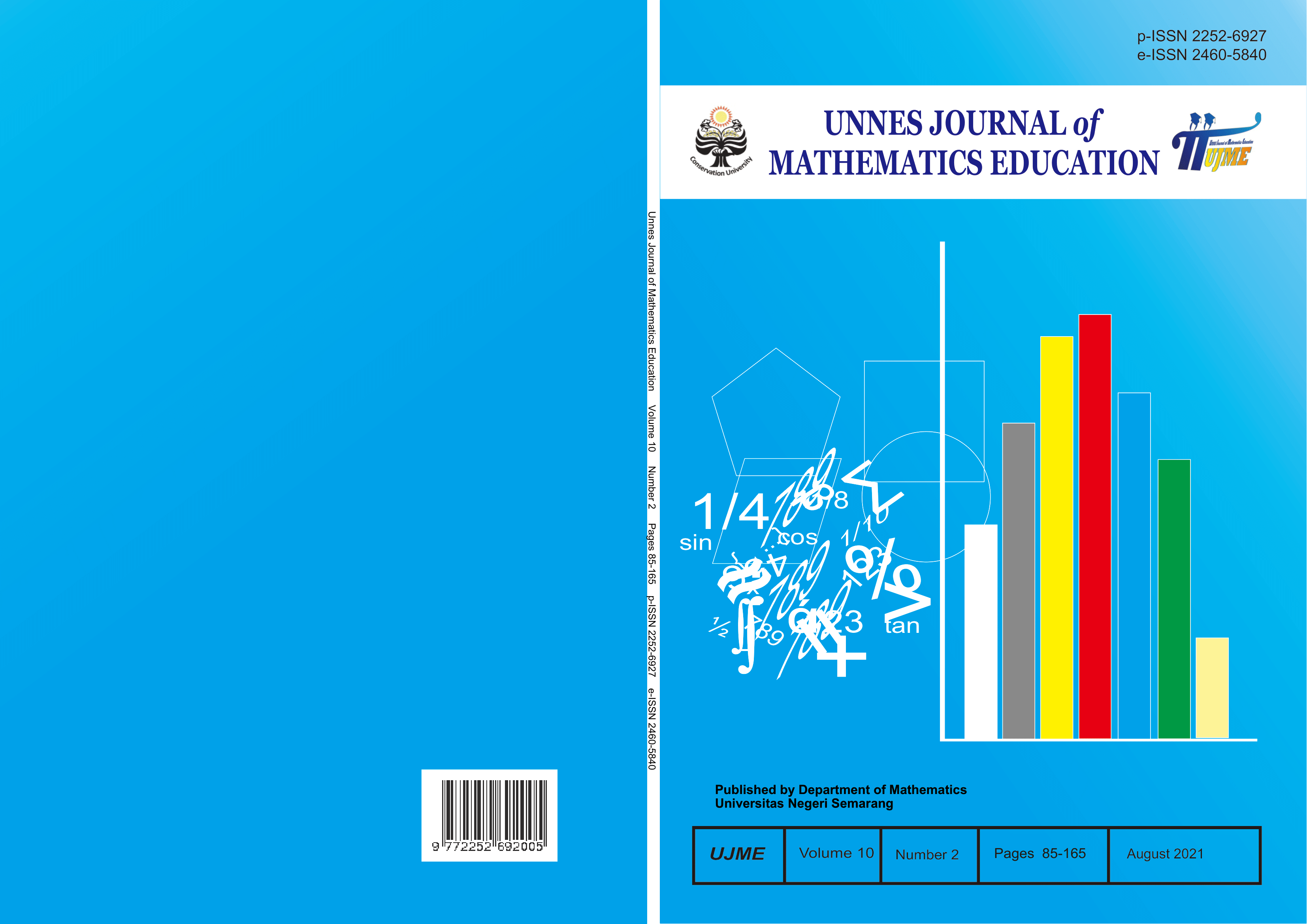Analysis of student’s mathematical problem solving ability based on responsibility learning with themed problem based learning model
##plugins.themes.academic_pro.article.main##
Abstract
The purposes of this research are to examine the differences in problem-solving abilities of seventh-grade students in quadrilateral material with the Themed Problem Based Learning and Problem Based Learning model and to examine the effect of students' responsibility towards the students' problem-solving abilities in quadrilateral material with Themed Problem Based Learning. This research uses a quantitative method. The population is the seventh-grade students in one of Junior High School in Bekasi in amount of 198 students. The selected samples are students grade VII-9 as an experimental group and students grade VII-8 as a control group. The methods of collecting data in this study are the method of test and questionnaire. Data analysis uses t-test and regression analysis test. The results of this research show that the average problem-solving abilities of students on Themed Problem Based Learning is over than the model of Problem Based Learning and the responsibility of the students' learning give an impact to the problem-solving abilities of students on Themed Problem Based Learning model.
##plugins.themes.academic_pro.article.details##
References
Eggen, P., & Kauchak, D. 2012. Strategi dan Model Pembelajaran mengajarkan konten dan keterampilan berpikir Edisi ke Enam. Jakarta: PT. Indeks.
Handal, B & Bobis, J. 2004. Teaching Mathematics Thematically: Teachers’ Perspectives. Mathematics Education Research Journal, 16(1): 3-18.
Hmelo-Silver, C.E. & H. S. Barrows. 2006. Goal and Strategies of Problem Based Learning Facilitator. Interdisciplinary Journal of Problem-Based Learning. Vol. 1 (1), 21-39.
Istikomah, F., Rochmad, & Winarti, E.R. 2017. Analisis Kemampuan Penalaran Induktif Siswa Kelas VII Pada Model Pembelajaran PBL-Bertema Ditinjau dari Karakter Tanggungjawab. Unnes Journal of Mathematics Education, 6(3): 345-351.
Kemendiknas. 2010. Pengembangan Pendidikan Budaya dan Karakter Bangsa. Jakarta: Badan Penelitian dan Pengembangan Pusat Kurikulum.
Kementerian Pendidikan dan Kebudayaan Republik Indonesia. 2014. Peraturan Menteri Pendidikan dan Kebudayaan Nomor 58 Tahun 2014 tentang kurikulum 2013 SMP/ MTs lampiran III. Jakarta: Menteri Pendidikan dan Kebudayaan Republik Indonesia.
Kementerian Pendidikan dan Kebudayaan Republik Indonesia. 2016. Peraturan Menteri Pendidikan dan Kebudayaan Nomor 21 Tahun 2016 tentang Standar Isi Pendidikan Dasar dan Menengah. Jakarta: Menteri Pendidikan dan Kebudayaan Republik Indonesia.
Min, K. C., Abdullah, M. R., & Mohd, I. N. 2012. Teachers’ Understanding and Practice Towards Thematic Approach in Teaching Integrated Living Skills (ILS) in Malaysia. International Journal of Humanities and Social Science, 2(23): 273-281.
National Council of Teachers of Mathematics. 2000. Principles and Standards for School Mathematics. Amerika: The National Council of Teachers of Mathematics, Inc. [Diakses 03-02-2018].
Puspendik, 2015. Laporan Hasil Ujian Nasional SMP/MTs Jawa Barat tahun 2014/2015. Puspendik.Kemendikbud.go.id.
Ramadhani, R. 2016. Pengembangan Perangkat Pembelajaran Matematika yang Berorientasi pada Model Problem Based Learning. Jurnal Kreano, 7(2): 116-122.
Rifa’i, A. & Anni, C.T. 2012. Psikologi Pendidikan. Semarang: Universitas Negeri Semarang.
Saleh, M. 2013. Strategi Pembelajaran Fiqh dengan Problem-Based Learning. Jurnal Ilmiah DIDAKTIKA, 16(1): 190-220.
Saputro, D. A., Masrukan, & Agoestanto, A. 2017. Analisis Kemampuan Penalaran Induktif Siswa Kelas VII Pada Model Pembelajaran PBL-Bertema Ditinjau dari Karakter Tanggungjawab. Unnes Journal of Mathematics Education, 6(2): 239-248.
Shoimin, A. 2014. 68 Model Pembelajaran Inovatif dalam Kurikulum 2013. Yogyakarta: Ar-Ruzz Media.
Sulastri, E., Mariani, S., & Mashuri. 2015. Studi Perbedaan Keefektifan Pembelajaran LC-5E dan CIRC Terhadap Kemampuan Pemecahan Masalah Matematika. Jurnal Kreano, 6(1): 26-32.
Triastuti, R., Asikin, M., & Wijayanti, K. 2013. Keefektifan Model CIRC Berbasis Joyful Learning Terhadap Kemampuan Penalaran Matematis Siswa SMP. Jurnal Kreano, 4(2): 182-188.
Undang-Undang Republik Indonesia Nomor 20 Tahun 2003 tentang Sistem Pendidikan Nasional. 2003. Jakarta: Depdiknas.
